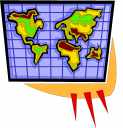Why All the Graphs in Economics?
Economics can be a complicated subject. You have to know about money and time and business and supply and demand and wants and needs and all kinds of other stuff. You have to be able to read charts and graphs and tables and ... wait a minute. Why all the charts and graphs? Why does Economics get to have all those tables and graphs and charts? Why doesn't History or Civics or Geography get to have all that fun, too? Well, that's a good question. You could probably ask a dozen different economists and social studies teachers, and you'd get a bunch of different answers.
Civics might have tables and charts showing breakdowns of different types of governments or who serves in what part of a government.
And the things economists study (like money, goods and services, supply and demand, interdependence, scarcity and choices, the stock market, and other business-related items) naturally lend themselves to graphic display. |
|
Social Studies for Kids
copyright 2002–2024
David White



 The
answer to that question that seems to make the most sense is
this one: Economics needs lots of charts and graphs and
tables because Economics uses more numbers and tracks more
trends than other social studies subjects.
The
answer to that question that seems to make the most sense is
this one: Economics needs lots of charts and graphs and
tables because Economics uses more numbers and tracks more
trends than other social studies subjects.
 Geography
has the map and certain graphs, but they usually show things
like elevation and population. (Yes, Geography has lots of
population graphs; and yes, those graphs show trends. But
Economics has graphs for everything.)
Geography
has the map and certain graphs, but they usually show things
like elevation and population. (Yes, Geography has lots of
population graphs; and yes, those graphs show trends. But
Economics has graphs for everything.)
 History
has the timeline, right? But that's just a line, going in
one direction, with a bunch of dates and events marked on
it. History is also full of charts and graphs, but Economics
still has it beat.
History
has the timeline, right? But that's just a line, going in
one direction, with a bunch of dates and events marked on
it. History is also full of charts and graphs, but Economics
still has it beat.
 Economics,
with its dependence on endlessly comparing present-day
numbers to month-ago numbers, needs a way to show that data
other than just listing numbers in lines of type. And
because many people can digest information more easily if
they see it on a graph, Economics can accommodate them by
showing graphs and tables and charts that put a visual face
on what is essentially a bunch of numbers.
Economics,
with its dependence on endlessly comparing present-day
numbers to month-ago numbers, needs a way to show that data
other than just listing numbers in lines of type. And
because many people can digest information more easily if
they see it on a graph, Economics can accommodate them by
showing graphs and tables and charts that put a visual face
on what is essentially a bunch of numbers.

